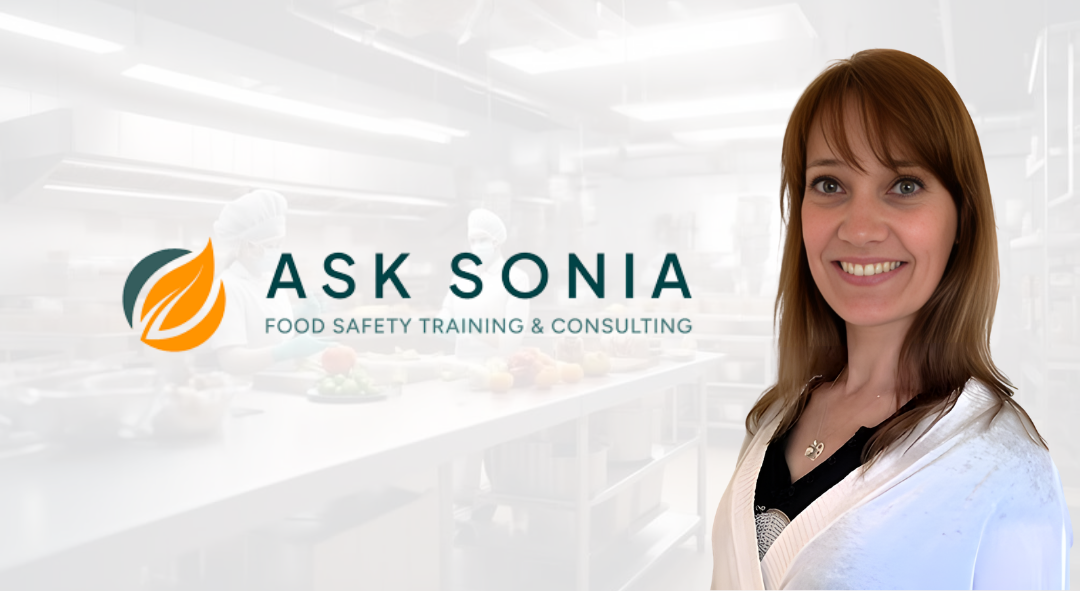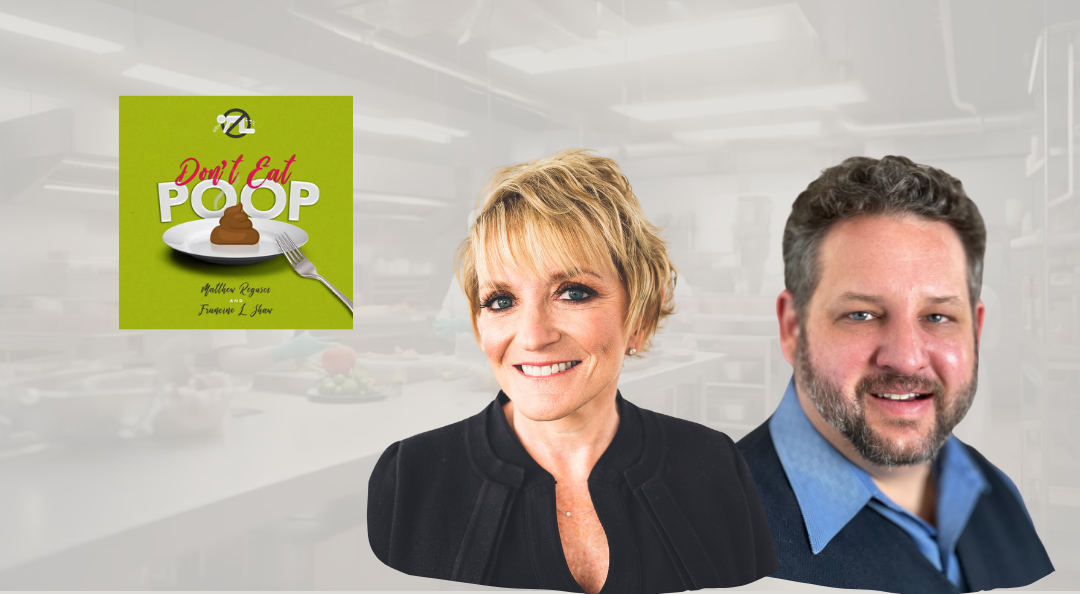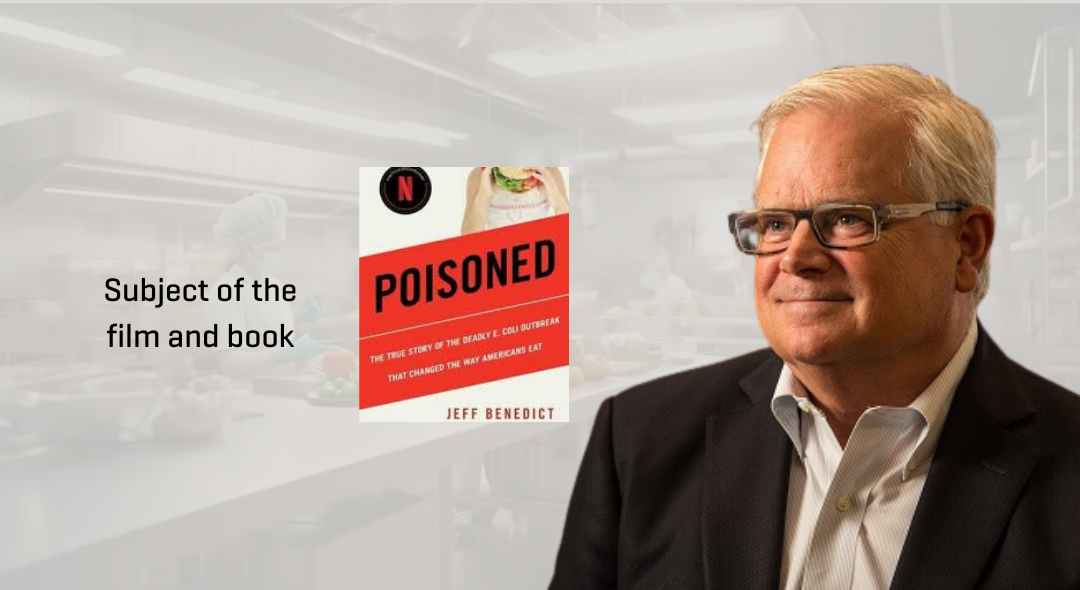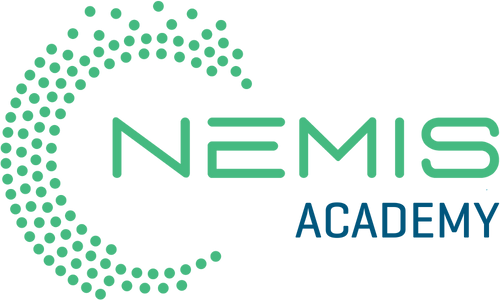- Home
- Join webinars
-1.png) Environmental monitoring
Environmental monitoring
Afraid of Recalls? Environmental monitoring can make you safe! (A vision for factory hygiene)
This webinar explores in very simple calculations on return of investment (independent of methods used), how a stringent environmental monitoring program can reduce risk and make quality managers feel at ease with their processes. It also shows how the advent of new molecular and digital methods has even made it possible to take control of your own risk management lowering the dependence on external partners.
- Mario Hupfeld
.png) Recall
Recall
3 Ways to Take the Crisis Out of Recalls
Discover 3 effective strategies to handle recalls smoothly and protect your business. Learn about proactive communication, recall simulations, and streamlined processes using technology. Join our upcoming webinar for free.
- Stephanie Weinand
-1.png) Phages In Food Safety
Phages In Food Safety
Bacteriophages: a New Opportunity in Food Safety
This presentation aims to provide food safety professionals, researchers, and industry stakeholders with valuable insights into the promising role of phages in transforming the landscape of bacterial detection and control and strengthening overall food safety measures. As the food industry continually seeks innovative solutions to ensure the safety of food products, understanding the applications and benefits of phages becomes crucial.
- Łukasz Richter
.png) HACCP
HACCP
Unveiling Food Safety Excellence: Beyond HACCP - A Comprehensive Webinar
The primary objective of HACCP is to identify, evaluate, and control hazards throughout the food production process, aiming to prevent, reduce, or eliminate potential risks. Integrating additional elements, such as Good Manufacturing Practices (GMP), traceability, and data management, enhances the comprehensiveness of a food safety program. Emphasizes the importance of viewing food safety as a holistic and dynamic process, requiring ongoing commitment and adaptability for effective risk identification, prevention, and response.
- Stefania Cesarano
-1.png) Digitalization of QMS
Digitalization of QMS
Four steps to successful digitalization of quality management in the food industry
The webinar outlines a four-step approach to successful digitalization: First, conducting a detailed assessment and planning based on a deep analysis of current processes. Second, selecting and integrating the right technology to enhance efficiency and reduce errors. Third, emphasizing the importance of employee training and change management for smooth implementation and high adoption. Finally, the necessity of continuous monitoring and optimization to adapt and improve digital systems and structures for lasting success.
- Philipp Osterwalder
-2.png) VBNC
VBNC
The ability of L. monocytogenes to enter into a viable but non-culturable (VBNC) state
The webinar focuses on the critical need for effective monitoring of microbial pathogens in food safety and hygiene, highlighting the limitations of growth-based tests in detecting bacteria in the viable but non-culturable (VBNC) state. It explores the under-researched impact of VBNC state bacteria on public health and food safety, emphasizing the need for better detection, risk assessment, and inactivation strategies. The discussion includes an overview of current knowledge and recent findings on Listeria monocytogenes in the VBNC state, analytical methods for detecting dormant bacteria, the induction of dormancy in food production environments, and effective measures against VBNC pathogens.
- Patrick Mester
-1.png) Root Cause Analysis
Root Cause Analysis
Root Cause Analysis (RCA) and Recovery from Microbiology Incidents
This presentation will outline the difference between an incident and a crisis and suggest how to manage the former and prevent escalation to the latter. It will describe, using real examples drawn from the speaker's own professional experience over the past 40 years, instances where root cause analyses were successful and, conversely, where the RCA was confounded and confused. For example, the RCAs from the world’s deadliest outbreak of listeriosis in South Africa; the Europe-wide frozen vegetable and UK butter listeria recalls; the salmonella in milk and yeast extract powders, chocolate and lecithin; the E. coli in frozen pizza; and botulinum toxin in hazelnut puree will be dissected. incidents before consumers were put at risk.
- Dr. Jeff Banks
-1.png) Foodborne Illness Litigation
Foodborne Illness Litigation
Foodborne Illness Litigation
Bill Marler is a lawyer best known for his work in food safety and foodborne illness litigation. He is the founder of Marler Clark, a law firm based in Seattle, Washington, that specializes in representing victims of foodborne illness outbreaks. Marler has represented clients in some of the most high-profile foodborne illness cases in the United States, including the 1993 Jack in the Box E. coli outbreak, the 2006 Dole spinach E. coli outbreak, the 2011 Listeria outbreak linked to cantaloupes from Jensen Farms and the 2018 Romaine E. coli outbreak.
Bill has also been a strong advocate for food safety reform and has worked with government agencies and industry leaders to improve food safety standards to prevent future outbreaks. Bill has been recognized for his work with numerous awards and accolades, including both the Seattle University Distinguished Law Graduate and Professional Achievement Awards, the Washington State Public Justice and Outstanding Lawyer Awards. Bill’s work has been profiled in the book “Poisoned” and in the Netflix documentary of the same name.
- Bill Marler
.png) Escherichia coli
Escherichia coli
Escherichia coli: A hygiene indicator underappreciated in food industry?
This presentation will outline how and why Escherichia coli is used in the assessment of the microbiological quality of drinking water and recreational waters. The most common methods for detection of E. coli will be described, as well as existing regulations for drinking water and food with respect to this indicator. The (bio-)chemical principle behind the novel NEMIS N-LightTM Escherichia coli test will be explained and examples given how the test can be used even in the presence of high amounts of food matrix. Finally, the question will be discussed whether this test could be a useful tool for environmental monitoring of food factories, indicating the the risk of fecal contamination and the potential presence of pathogens transmitted via the fecal-oral route such as enterohemorrhagic E. coli (EHEC), Campylobacter jejuni and enteroviruses, thereby complementing the widely used Enterobacteriaceae tests.
- Dr. Julian Ihssen
.png) Incident management
Incident management
Crisis Management and Incident Handling in the Food & Beverage Sector
This informative webinar is designed to equip professionals in the Food & Beverage sector with essential strategies for managing crises and handling incidents, focusing specifically on food safety events. Participants will gain valuable insights into the entire crisis management lifecycle, encompassing preparation, response, and recovery phases. The session highlights the importance of a holistic approach to incident management, emphasizing that successful resolution requires the active involvement of all organizational departments and external resources.
Prof. Bizhan Pourkomailian specializes in food safety management systems with extensive experience in developing, implementing, auditing, training, presenting and consulting the food & beverage sector across Europe, the Middle East, Asia and the USA. The scope of his work reaches across the supply chain, with hands-on experience in farms/fields, slaughter/deboning, production, transportation/warehousing, and restaurants for food and its packaging. Involved in developing and deploying food safety and quality system verification standards in these sectors. Developed McDonald's global supply chain incident management standards and its external verification protocol. Prof. Bizhan Pourkomailian is focused on the third part of the restaurant audit program, digitalisation, and enhancing hygiene standards and distribution of food safety standards.
- Prof. Bizhan Pourkomailian
 HACCP
HACCP
HACCP & Auditing Approaches
Key take aways:
- HACCP how it all started with NASA
- What is required by CODEX and GFSI/BRCGS
- Prerequisites programme management linking to what is required by BRCGS standards
- Understanding Risks and Hazards in the Hazard Analysis
- Validation and Verification clarification of terminology and how it can be demonstrated
- Auditing approaches to HACCP:
- Benefits of using the process flow diagram and CCP summary sheet when auditing HACCP in the factory
- Key documentation to see to support the HACCP plan
- Nic Sharman
-3.png) Food Authenticity
Food Authenticity
Food Authenticity – Mitigating Emerging Risks and Threats
Food fraud is an age old problem that reoccurs periodically in the global supply network. The prevention of food fraud is paramount to protect the trust of our consumers and to maintain fair, sustainable business practices. No process can guarantee that food and food supply are not the target of criminal activity. The purpose of this presentation is to act as a guide through approaches and processes to improve the resilience of supply networks to food fraud.
Food fraud costs the global food industry an estimated US$40 billion a year, in addition to the loss of confidence and economic disadvantage to the consumer.
Food fraud can harm consumers, causing illness and even death in some cases. This was true in 2008 when melamine was used as a nitrogen source to fraudulently increase the measured protein content of milk, resulting in more than 50,000 babies hospitalised and six deaths after having consumed contaminated infant formula.
Since the 2013 issue of the fraudulent replacement of horsemeat in UK beef products, there is world-wide consensus that as well as being better at detecting food fraud, more needs to be done to prevent food fraud from happening in the first place.
- Sterling Crew
-2.png) Compressed Air
Compressed Air
Compressed Air: The risks, regulations and requirements to prevent contamination (free)
Join us for an insightful webinar led by Sara Deckers, a seasoned expert with 15 years of experience in compressed air treatment and quality management. Specializing in the food and beverage industry, Sara has dedicated her career to helping manufacturers identify and mitigate risks associated with compressed air contamination.
Key Takeaways:
- Understanding Definitions and Quality Classes: Gain clarity on the key terms and classifications crucial for maintaining compressed air quality.
- Identifying Potential Risks: Learn how to pinpoint potential contamination risks within your production processes.
- Implementing Risk Reduction Solutions: Discover practical solutions to minimize contamination risks and enhance product safety.
- Defining Clear Protocols: Develop comprehensive protocols for analyzing and addressing points of contact with compressed air in your operations.
- Sara Deckers-Milsom
- Sep 3,2024
- 45 minutes
 Environmental Monitoring
Environmental Monitoring
Environmental Monitoring (EM): Opportunities and Challenges
Key takeaways:
- Different purposes of EM
- Risk change in EM due to new technologies
- Elements of an EM risk assessment
- How to set up a risk-based EM plan
- Anett Winkler
-1.png) Food Supply
Food Supply
Restoring Consumer Confidence in the Food Supply
Join us for an insightful webinar on food safety in the wake of recent regulatory changes and a new administration. Titled Restoring Consumer Confidence in the Food Supply, this session will delve into the most effective regulatory and legislative strategies to enhance the food safety system and protect public health.
- Brian Ronholm
.png) Old Age Pathogens
Old Age Pathogens
OAP’s (Old Age Pathogens) Finding New Homes
Key Takeaways:
- Evolving Transmission Vehicles: Learn how traditional pathogens are finding new ways to spread in our increasingly complex food supply chain.
- Microbiological Challenges of Plant-Based Diets: Explore the unique food safety challenges presented by the growing popularity of plant-based diets, and what this means for consumers and producers alike.
- Cutting-Edge Analytical Tools: Discover the latest advancements in food safety technology, including Whole Genome Sequencing and metagenomics, that are revolutionizing our ability to detect and combat pathogens.
- John Donaghy
 Outbreaks
Outbreaks
Recent Outbreaks and Their Implications for the Global Food System
In this talk, Dr. Firestone will examine three major outbreaks from the last two years, exploring how these incidents highlight vulnerabilities in our globalized food system. With expertise in infectious diseases and environmental health, Dr. Firestone will discuss how environmental factors—including the role of restaurants—contribute to foodborne disease transmission, offering crucial insights into public health surveillance and prevention.
- Dr. Melanie Firestone
.png) Food Safety
Food Safety
Food Safety Culture in Food Industry
Houda Reggad is a strategic consultant and problem solver renowned for her accomplished and self-motivated approach. Her education and diverse work experiences have shaped her into a versatile professional with a profound impact across various industries, including Food industry.
With a solid background in Food Science, Houda has honed her expertise as a quality and food safety auditor. This specialized knowledge has enabled her to implement rigorous standards and practices that ensure the highest levels of food safety and quality within organizations.
- Houda Reggad
.png) Entering New Markets
Entering New Markets
Entering New Markets Using Improved Food Safety: The Case of Smallholder Farmers
Key Takeaways:
- Practical Approaches for Smallholders: Learn how smallholder farmers can adopt GFSI-approved agricultural and postharvest practices, even in resource-constrained environments.
- Benefits of Improved Food Safety: Discover how enhanced food safety practices lead to better market access, increased efficiency, stronger brand reputation, and improved sustainability for smallholders.
- Real-World Examples: Misha will share insights from his work with smallholder women farmers and food SMEs worldwide, illustrating the tangible impacts of food safety on market success.
- Misha Voronenko
-4.png) Recalls
Recalls
Inside 2024’s Major Food Recalls: Expert Insights with Darin Detwiler
This is your chance to challenge the speaker and engage in live Q&A as Dr. Detwiler shares his expert insights into what went wrong in 2024 and what can be done to prevent future incidents. Attendees are encouraged to bring their questions and contribute to this open dialogue on food safety and recall prevention.
- Dr. Darin Detwiler
- Dec 12,2024
- 45 minutes
-2.png) Dry Floor Sanitizers
Dry Floor Sanitizers
Revolutionizing Clean: The Science Behind Dry Floor Sanitizers
Key Presentation Takeaways
- Floors are a high-risk area for pathogen contamination, even dry floors.
- Dry floor sanitizers are dry powders/granules applied to floors that when activated exhibit antimicrobial activity in the surrounding environment and reduce the spread of microbial contamination. They are applied in various locations including foot pans, entry ways and adjacent to drains.
-Dry floor sanitizers are formulated products consisting of an active (e.g., PAA) along with co-formulants that can enhance stability, increase wetting, and boost efficacy.
- Like all sanitizers and disinfectants, dry floor sanitizers are regulated products and therefore need to pass various levels of efficacy testing. These test methods may not always accurately reflect how the product is used, and novel methods are being developed to demonstrate product efficacy and enhance regulatory assessment. - The performance observed in lab studies is also demonstrable in field trials conducted at various food production facilities.
- Dr. Bruce Urtz
 Food Safety
Food Safety
Food Safety Culture (free)
Key Presentation Takeaways
- Understanding the importance of food safety culture and how it influences behavior.
- Exploring the integration of food science and behavioral science for risk management.
- Learning about systems-based approaches to improve food safety outcomes.
- Practical strategies for fostering a culture of safety within your organization.
- Frank Yiannas
- Jan 23,2025
- 45 minutes
 Salmonella Contamination
Salmonella Contamination
Preventing Salmonella Contamination – Better Testing and Risk Management
Dr. Chaves’s research focuses on validating product and process parameters to enhance the effectiveness of antimicrobial interventions in meat and poultry, as well as understanding bacterial growth, inactivation parameters, and viral persistence on food and contact surfaces. His Extension programs provide essential technical assistance and training for food manufacturers in areas like food safety, sanitation, and regulatory compliance.
- Dr. Byron Chaves
.png) Food Safety
Food Safety
CATALYSE: Catalysing scientific innovation into food safety action
🔹Discover the barriers preventing the uptake of inventions in food safety.
🔹 Learn how CATALYSE is supporting innovators to bring their ideas to life by engaging decision-makers and launching pilots.
🔹 Gain insights into fostering knowledge and innovative solutions across the food safety value chain.
- Edward Sliwinski
.png) Salmonella risk
Salmonella risk
How to Design a Resilient Supply Chain to Protect your Business in Case of a Salmonella Outbreak
Salmonella risks are managed and controlled through HACCP combining the control of identified CCPs and implementing Prerequisite programs. This has dramatically improved the safety of food over the past decades.
Companies have also improved their response to identified Salmonella cases but are also becoming more vulnerable with globalization of sourcing, reduction of inventories and acceleration of supply chains.
The presentation will build on a true Salmonella case and will share learnings to design a more robust Supply Chain in the eventuality of a Salmonella contamination.
- Dominique Walch
.png) Listeria monocytogenes
Listeria monocytogenes
Challenges in Regulating Listeria monocytogenes in Food
Key takeaways:- Overview of the listeriosis outbreak in South Africa in 2017/2018
- Exhibiting a real-life example of the difference between a hazard and a risk
- The impact of a dubious regulation on food security in a developing economy
- The importance of technical competence at national authority level
- Dr. Lucia Anelich
 HACCP
HACCP
Back to basics: HACCP & the law (free)
- Sonia Andre
 Food Safety
Food Safety
Ensuring Food Safety Worldwide: Tackling Challenges and Paving the Way for a Safer Future (free)
Key takeaways:- Major Developments in Food Safety
- Cutting-Edge Technologies Shaping the Future
- Consumer Expectations Fueling Industry Change
- Francine Shaw & Matt Regusci
- Apr 16,2025
- 45 minutes
.png) Food Allergens
Food Allergens
Food Allergens: Lessons learnt.The impact of food allergen culture and behavioral science (free)
Key takeaways:✔️ Review real-world cases through the lens of behavioural science.
✔️ Evaluate the effectiveness of current food allergen control systems.
✔️ Discuss how attitudes towards food allergens have changed over the past 45 years.
✔️ Explore key learnings and opportunities for improvement in food safety practices.
- Sterling Crew
- Apr 22,2025
- 45 minutes
 Food Safety Leaders
Food Safety Leaders
Empowering Food Safety Leaders: Strategies for a Digital Age (free)
Join us for an insightful and thought-provoking webinar, featuring Dr. Bizhan Pourkomailian, where we’ll explore innovative solutions, emerging risks, and the role of technology in enhancing food safety systems across global supply chains.- Prof. Bizhan Pourkomailian
- May 7,2025
- 45 minutes
 HACCP
HACCP
Beyond Compliance: The True Purpose of HACCP (free)
Join us for an insightful and thought-provoking webinar, featuring Sara Mortimore, where we will explore how HACCP can be leveraged to build a culture of proactive food safety management.- Sara Mortimore
- May 28,2025
- 45 minutes
 Foodborne Outbreaks
Foodborne Outbreaks
Digging into the Dollars: The True Cost of Foodborne Outbreaks (free)
What are the costs associated with a foodborne illness outbreak? Cost correction measures, while necessary to contain outbreaks, can be more costly and reactive. The repercussions of such outbreaks are profound, affecting individuals' health and businesses' reputations and operational viability. This engaging session will unravel the complexities of food safety law and its implications for public health and legal practice.- Bill Marler
- Jun 11,2025
- 45 minutes
.png) Food Safety Challenges
Food Safety Challenges
Combatting major food safety challenges through the 4th Industrial Revolution (free)
Join us for an enlightening webinar featuring Professor Chris Elliott, PhD, FRSC, FRSB, MRIA, OBE, a prominent figure in the field of food security. This event will address cutting-edge solutions to some of the most pressing food safety challenges in the context of the 4th Industrial Revolution.- Prof. Chris Elliott
- Jun 18,2025
- 45 minutes
.png?width=300&height=180&name=Nemis%20academy%20posts%20(3).png)
Interested in becoming our speaker? Let's get in touch!
Contact us if you would love to share some industry updates.

